Posted: March 17th, 2017 | No Comments »
The British Film Institute has (or is about to) released these two Chinese classics on DVD…..fantastic…
The Goddess
 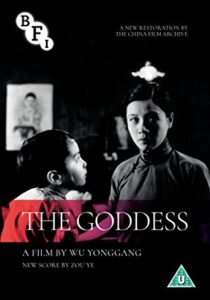
Ruan Lingyu, one of the most famous stars of early Chinese cinema, gives a devastating performance as an unnamed ‘goddess’ – an ironic euphemism for a prostitute – in this profoundly moving but rarely seen classic of world cinema. A tragic tale of shame and maternal sacrifice, Ruan stars as a mother desperate to provide for her young son and forced to take brutal vengeance on her pimp. It is a profoundly moving drama, all the more poignant by the fact that its star committed suicide at the age of 24, a year after the film’s release.
Newly restored by the Chinese Film Archive, this iconic film boasts a new score by renowned composer Zou Ye. Premiered at the BFI London Film Festival in 2014, this long-awaited release makes one of the most important early Chinese films finally available on DVD in the UK, and will delight all fans of silent cinema.
The Spring River Flows East

Directed by Cai Chusheng and Zheng Junli, and originally released in two parts in 1947, The Spring River Flows East is generally considered one of the great Chinese films of the period. More on the movie here
Posted: March 16th, 2017 | No Comments »
In 1932 US Marines lined the banks of the Soochow (Suzhou) Creek with barbed wire and sandbag embankments to prevent incursions by the Japanese military south into the heart of the International Settlement. They had to do it again in 1937 – both times all the way from up near Jessfield Park and St Johns University down to the Whangpoo River….
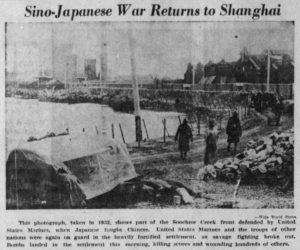
Posted: March 15th, 2017 | No Comments »
Pang Likwan’s The Art of Cloning looks like an interesting take on art in the Cultural Revolution…

Cultural production under Mao, and how artists and thinkers found autonomy in a culture of conformity
In the 1950s, a French journalist joked that the Chinese were “blue ants under the red flag,†dressing identically and even marching in an identical fashion. When the Cultural Revolution officially began, this uniformity seemed to extend to the mind. From the outside, this was a monotonous world, full of repetitions and imitation, but a closer look reveals a range of cultural experiences, which also provided individuals with an obscure sense of freedom. In The Art of Cloning, Pang Laikwan examines this period in Chinese history when ordinary citizens read widely, travelled extensively through the country, and engaged in a range of cultural and artistic activities. The freedom they experienced, argues Pang, differs from the freedom, under Western capitalism, to express individuality through a range of consumer products. However, it was far from boring, and filled with its own kind of diversity.
Posted: March 14th, 2017 | No Comments »
Chinese Cinema: A (Brief) Intro to the First Century
by Dr Rob Hemsley
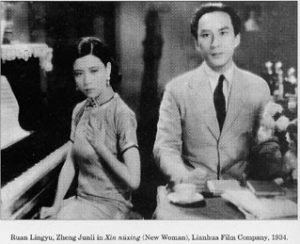
In his talk “Chinese Cinema: A (Brief) Intro to the First Centuryâ€, Dr Rob Hemsley presents an entertaining but also academically grounded overview of how the Chinese film industry has transformed since its earliest days. The history of Chinese cinema is a rollercoaster ride, with themes and genres often shifting in unison with the social and political movements of the time. So jump on board for a trip – enlivened by video snippets — not just through one hundred years of Chinese film, but through one hundred years of Chinese history as well.
WHAT: “Chinese Cinema: A (Brief) Intro to the First Century†by Dr Rob Hemsley
WHEN: Sunday, Mar. 19, 4:00 – 5:30 PM
WHERE: Capital M www.m-restaurantgroup.com  tel (86 10) 6702 2727
3/F, No. 2 Qianmen Pedestrian Street (overlooking Tian’anmen Square)
Beijing 100051ä¸å›½Â 北京市 å‰é—¨æ¥è¡Œè¡—2å·3层 邮编 100051 (尽览天安门全景)
HOW MUCH: RMB 75 per person, which includes a welcome drink
RSVP: please email communications.ras.bj@gmail.com and write “Cinema†in the subject header
MORE ABOUT THE SPEAKER:
Dr Rob Hemsley arrived in the small Chinese city of Lu’an, in Anhui Province, over a decade ago and for the next few years found himself hosting a weekly show on local TV. After that, he worked for international media in Beijing, and in 2015 was hired to teach a number of film-related courses at Tsinghua University. Dr. Hemsley specializes in the study of Film and Religion – which he launched as a course at Tsinghua – and also maintains a strong interest in the Chinese film industry and its tumultuous history.

Posted: March 13th, 2017 | No Comments »
This picture accompanied an article on Harbin’s Russian community in 1936, though I suspect the photograph of the is somewhat older…droshky’s were quite common in the city…

Posted: March 12th, 2017 | No Comments »
As promised after yesterdays ‘Know Your World – Shanghai’, here is May 1934’s ‘Know Your World – Hangchow’ (or Hangzhou if you prefer)…again,. you can click on the image to enlarge it….
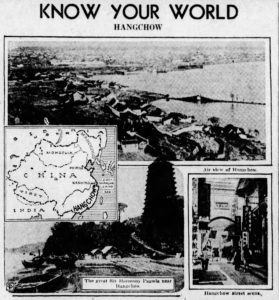
Posted: March 11th, 2017 | No Comments »
‘Know Your World’ was a US syndicated newspaper column that took different places internationally and showed readers what they were like – simple idea really in the days before google image…in May 1934 it was China’s turn….first Shanghai (you can click the image to enlarge)…and then Hangchow (tomorrows post)….
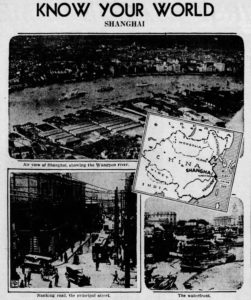
Posted: March 10th, 2017 | No Comments »
Out of China: How the Chinese Ended the Era of Foreign Domination
Professor Robert Bickers (University of Bristol)
Date:13 March 2017Time: 5:00 PM
Venue: Russell Square: College Buildings Room: G3
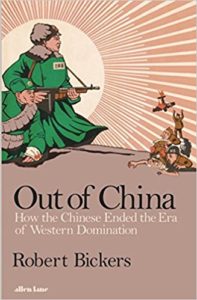
It’s only eighteen years since the end of the era of the Chinese ‘treaty ports’. In 1999 the last foreign-controlled outpost, Macao — the first to have been detached from Chinese control — was formally returned. In this talk Robert Bickers will draw on his new book, Out of China, to highlight key moments in the history of the decline of foreign power in China, its awkward persistence into the 1990s, and its enduring legacies.
more details – here









